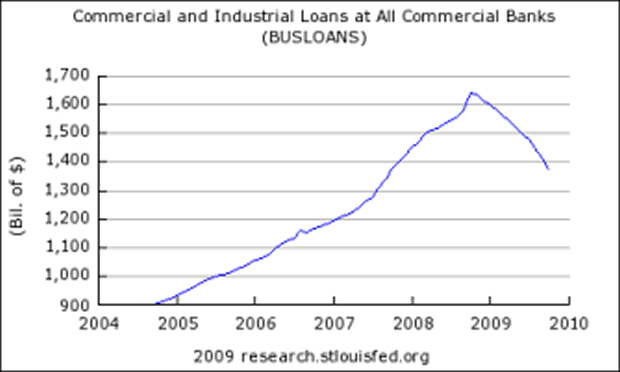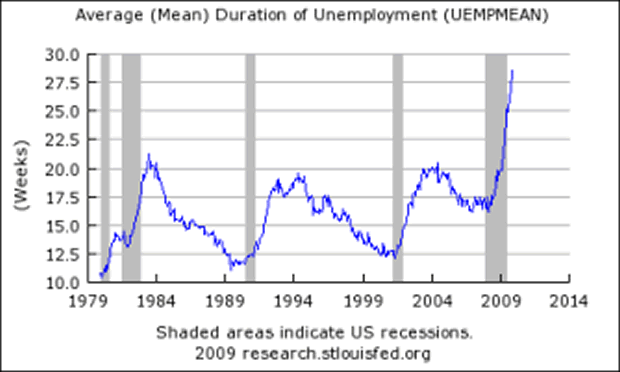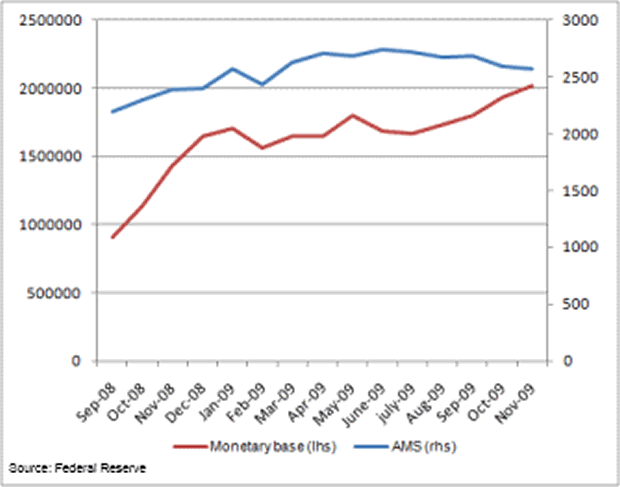U.S. Economy Looking Very Sick Indeed
Economics / Recession 2008 - 2010 Dec 14, 2009 - 03:39 AM GMTBy: Gerard_Jackson
 No matter how the administration's friends and media lapdogs try to paint it the US economy is still in rotten shape. In fact, the situation is far worse than most people realise. Manufacturing surveys suggest a slow though steady recovery. I don't buy it, at least not yet. These surveys also report that the situation for unfilled orders is deteriorating, which means that orders for capital goods in the form of machinery is falling. Industrial production for October to October was down 7.1 per cent. Although it's true that industrial production from May to October is up by 2.5 per cent it is still below its 2002 level.
No matter how the administration's friends and media lapdogs try to paint it the US economy is still in rotten shape. In fact, the situation is far worse than most people realise. Manufacturing surveys suggest a slow though steady recovery. I don't buy it, at least not yet. These surveys also report that the situation for unfilled orders is deteriorating, which means that orders for capital goods in the form of machinery is falling. Industrial production for October to October was down 7.1 per cent. Although it's true that industrial production from May to October is up by 2.5 per cent it is still below its 2002 level.
However, as I have pointed out so many times before, manufacturing is the real indicator, and it is down 8 per cent for the year October to October, though it picked up in July it fell again in October. Spending on equipment went positive in July and August before it too turned negative again. There is certainly no sign of a robust recovery here. A genuine recovery should be marked by an increase in the demand for business loans. The following chart shows a steep fall in loans with no upturn in sight.

Some commentators are complaining that the banks are refusing to lend to business. Others have pointed out — rightly in my opinion — that the demand by business for loans is extremely weak. This is only to be expected given the bleak prospects for profits. What 'profits' there are appear to be coming from cost-cutting, which means that revenue and sales haven't picked up. The credit situation has led to the conclusion that consumer spending is being strangled and that this is preventing a recovery. How many times must this be said: consumer spending is only about a third of total economic activity. In addition, it is business spending that needs to be revived, not consumer spending. Those who argue otherwise overlook the fact that ultimately business is the true source of all consumer spending. Their view of the importance of consumer spending could only hold in a two-stage economy. Over 70 years ago it was pointed out:
The larger number of payments is not from consumers to producers, but is made between producers and producers, and tends to cancel out in any computation of net incomer of net product value. "In fact, income produced or net product is roughly only about one-third of gross income." [Italics added]. What is cost for one producer is in part income for some other producer, but part of that income the latter has to pay out in costs to other producers in another stage of the productive process (for intermediate products, raw materials, supplies, etc.), and so on. All that is necessary in order that equilibrium be maintained is that consumers' incomes equal the cost of producing consumers' goods; the total of producers' payments necessarily exceeds that of consumers' incomes. (C. A. Phillips, T. F. McManus and R. W. Nelson, Banking and the Business Cycle, Macmillan and Company 1937, p. 71).
The grim unemployment figures are a stark reflection of the dismal state of the economy. Moreover, they also reveal that the duration of unemployment has lengthened and is now the longest since WWII, indicating that the necessary economic adjustments have yet to be made.

In a desperate attempt to reverse the recession Bernanke let loose with the money supply, more than doubling the monetary base from September 2008 to November 2009 while driving the fed's funds rate down to zero. And still production languishes and the real unemployment rate rises. It seems that someone forgot to tell Bernanke that firms are not going to borrow and hire if there are no prospects of making a profit. And they will most certainly exercise considerable caution in the present political climate where they have to face a situation in which an administration seems completely incapable of grasping even the most basic economic facts and principles.
The chart below uses the Austrian* definition of the money supply. We can see that AMS peaked last June and has since declined while at the same time the monetary base accelerated. As the banking system is the major source of money it is clear from the figures that bank deposits have not been expanding. What we have instead is a massive increase in the reserves of depository institutions which now pose an immense inflationary threat to the US economy. In the meantime, the AMS figure suggest an inadvertent 'monetary tightening' that will have a detrimental impact on economic activity. The fall in capital orders could be an unwelcome sign of this event. We shall see soon enough.

It's time the meaning of recovery was properly understood. It does not merely mean a return to full employment but a situation where an economy is on a sustained path of capital accumulation. In other words, economic growth. Obama's economic policies are in fact anti-growth. His borrowing, spending, taxing, energy and regulatory proposals are a vicious recipe for economic decline, a situation where full employment could only be maintained at an ever lower real wage rate. Attempts to offset this destructive path with a loose monetary policy will only result in accelerating inflation.
Those who blindly support this economic nonsense are no better than Charles Fourier who believed that under socialism the oceans would turn to lemonade.
*There are some differences among Austrians as to what ought to be included in a definition of the money supply. I try adhere to Walter Boyd's view who in his open letter to Prime Minister Pitt in 1801 defined money in the following terms:
By the words 'Means of Circulation', 'Circulating Medium', and 'Currency', which are used almost as synonymous terms in this letter, I understand always ready money, whether consisting of Bank Notes or specie, in contradistinction to Bills of Exchange, Navy Bills, Exchequer Bills, or any other negotiable paper, which form no part of the circulating medium, as I have always understood that term. The latter is the Circulator; the former are merely objects of circulation. (Walter Boyd, A Letter to the Right Honourable William Pitt on the Influence of the Stoppage of Issues in Specie at the Bank of England, on the Prices of Provisions, and other Commodities, 2nd edition, T. Gillet, London, 1801, p. 2).
In simple terms, money is the medium of exchange. Nevertheless, difficulties do arise. Are savings deposits money? This presents the problem of double-counting. If I take $10,000 in cash and deposit it in my savings account it cannot be seriously I argued that I have now expanded the money supply by $10,000. It therefore follows that if the bank lends out that $10,000 the money supply still remains unchanged. We now deduce that credit transactions do not alter the money supply. Whether we include savings deposits in our definition depends on whether or not it involves double-counting.
By Gerard Jackson
BrookesNews.Com
Gerard Jackson is Brookes' economics editor.
Copyright © 2009 Gerard Jackson
Gerard Jackson Archive |
© 2005-2022 http://www.MarketOracle.co.uk - The Market Oracle is a FREE Daily Financial Markets Analysis & Forecasting online publication.



